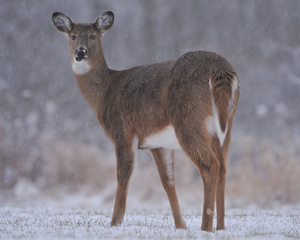
Monday December 6, 2021 | NATIONAL
by Mary P Brooke, B.Sc. | Island Social Trends
COVID-19 has infected domestic animals and wildlife during the pandemic that was officially declared by the World Health Organization on March 11, 2020 (and in BC as a health emergency on March 17 last year). The first case in people was detected in China in December 2019 and in Canada by January 2020.
New information on the SARS-CoV-2 virus (which causes COVID-19 infection) emerges every day. Scientists in Canada and around the world are working hard to better understand the virus and its impacts on people, communities, and animals, says Environment and Climate Change Canada (ECCC).
“The Government of Canada continues to take strong, immediate, and effective action to protect Canadians from the impacts of COVID-19,” it was stated in a news release on December 1, 2021, now 20 months into the COVID pandemic.
Spilling into wildlife:
In that context, ECCC announced that they — along with the Canadian Food Inspection Agency (CFIA), the Public Health Agency of Canada, Parks Canada, provincial and territorial governments, Canadian Wildlife Health Cooperative (CWHC), and academic partners — have been proactively engaged in research to investigate whether SARS-CoV-2 has spilled into wildlife.
Last month Provincial Health Officer Dr Bonnie Henry called an end to mink farming in BC (being phased out by 2025) due to the transference of the SARS-CoV-2 virus between humans and animals on mink farms. In a press conference she expressed concern about the virus also transferring into wildlife beyond the farms, noting the transfer to deer and cats has already been documented.
Multiple animal species already infected:
While there is limited information on animals and COVID-19, the virus has infected multiple species of animals globally, including farmed mink, companion animals (e.g., cats, dogs, ferrets), and zoo animals (e.g. tigers, lions, gorillas, cougars, otters, and others).
Recent reports in the United States have revealed evidence of spillover of SARS-CoV-2 from humans to wild white-tailed deer, with subsequent spread of the virus among deer. There has been no known transmission of SARS-CoV-2 from deer to humans at this time, said ECCC in their news release.
On November 29, 2021, the National Centre for Foreign Animal Disease (CFIA) confirmed the first detections of SARS-CoV-2 in three free-ranging white-tailed deer in Canada. These deer were sampled between November 6 to 8, 2021 in the Estrie region of Quebec. Samples for SARS-CoV-2 were collected through a big game registration station in southern Quebec. Similar to findings in the United States, the deer showed no evidence of clinical signs of disease, and were all apparently healthy. The World Organisation for Animal Health (OIE) was notified on December 1, 2021.
As this is the first detection of SARS-CoV-2 in wildlife in Canada, information on the impacts and spread of the virus in wild deer populations is currently limited. This finding emphasizes the importance of ongoing surveillance for SARS-CoV-2 in wildlife to increase our understanding about SARS-CoV-2 on the human-animal interface.
Federal, provincial and territorial partners continue to monitor and assess the potential implications of the virus on Canadian wildlife.
Wild deer are seen throughout the Greater Victoria area here on Vancouver Island. Some municipalities, such as Oak Bay, have programs using contraception to reduce the deer population which often destroys foliage in gardens and yards and can present hazards to traffic.
Added precaution when handling deer:
COVID-19 remains largely a disease of human concern and typically spreads from human to human, says ECCC. “Adhering to public health advice and getting fully vaccinated are key ways to protect against COVID-19,” it was stated by the federal government.
At this juncture in the pandemic, being ‘fully vaccinated’ may now mean receiving three doses of the COVID vaccine, i.e. the first two doses, plus a booster after another six months.
Until more is known and as an added precaution, it is recommended that people wear a well-fitting mask when exposed to respiratory tissues and fluids from deer, practice good hand hygiene, and avoid splashing/spraying fluids from these tissues as much as possible.
Additional information is available on exposure and transmission of COVID-19 in various wildlife species can be found at Animals and COVID-19.
===== Associated links (provided by government)
- Coronavirus disease (COVID-19): Prevention and risks
- Wildlife health and SARS-CoV-2: Handling Guidelines (PDF)
- COVID-19 – OIE – World Organisation for Animal Health
- Hunting, fishing and trapping during the COVID-19 pandemic
===== RELATED Articles:
Mink farming phase-out planned in BC (BC Government news release – November 5, 2021)
Mink farming curtailed in BC after more test-positive SARS-CoV-2 cases (July 27, 2021)
BC SPCA calls for immediate moratorium on mink farming (December 16, 2020)





